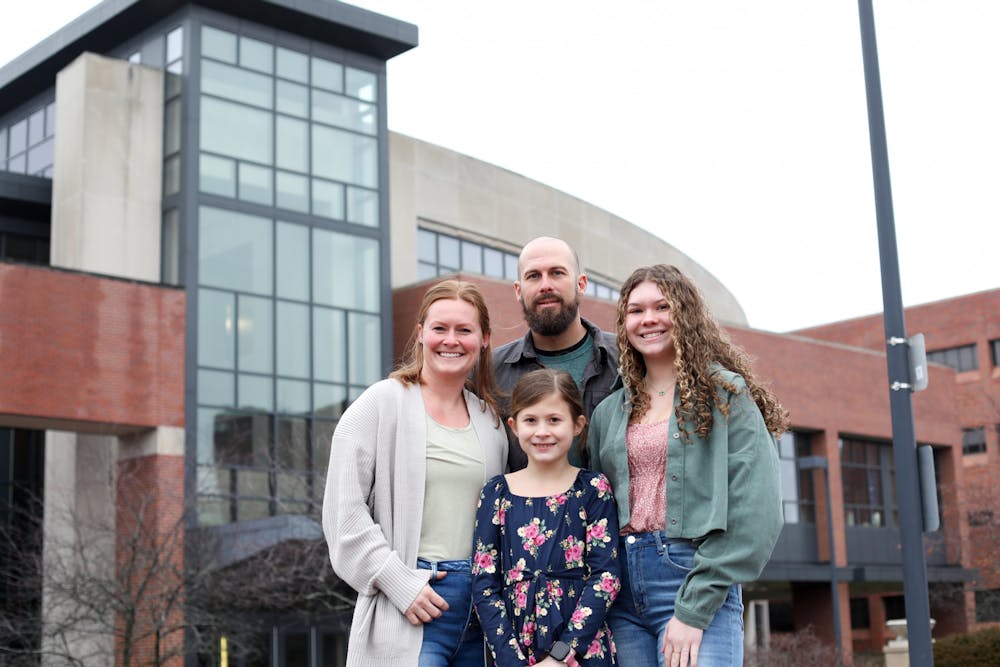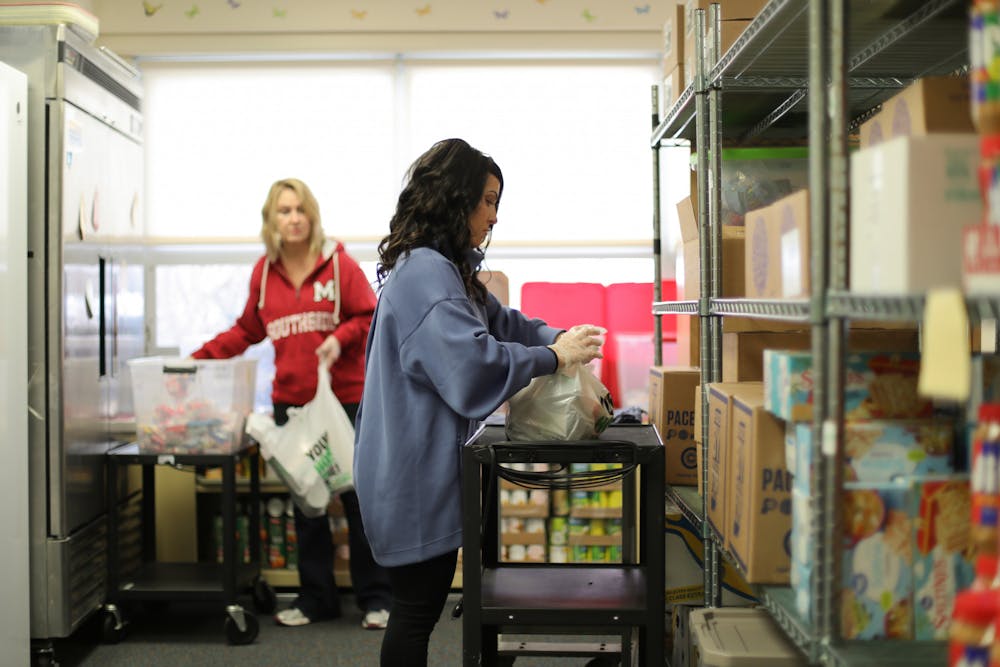Delta High School lunch is $2.80 per day, while Elementary School lunch is $2.60 per day. Breakfast is $1.50 in all of Delaware Community School Corporation.
Burris Laboratory School lunch is $3.30 per day, while breakfast is $2.
At Yorktown Community Schools, Breakfast is $1.75, while reduced-price breakfast is 30 cents. Lunch is $3.35, while reduced-price lunch is 40 cents.
At Daleville Community Schools, breakfast is $2.10 for all students, lunch is $3 for elementary schoolers and lunch is $3.10 for junior and senior high students.
At Wes-Del Community Schools, elementary paid lunch is $2.60 and middle school/high school lunch is $2.80.
At Cowan Community Schools, elementary breakfast is $1.50 and lunch is $2.50. For the Jr/Sr High School breakfast is $1.50 and lunch is $2.70.
At Liberty-Perry Community Schools, breakfast is $2 and lunch is $3.
At Muncie Community Schools, meals are free to all students.
When Deb Huston was growing up in Muncie, Indiana, oftentimes, someone not related to her would eat dinner and stay overnight in her family’s house. From a young age, Huston’s parents were doing what they could to help at-risk members of the community.
Huston said her childhood instilled a passion in her early on. She wanted to help children have the best quality of life. This passion drove her to create Panther Pantry in 2015 as a weekend backpack program at Muncie Southside Middle School to provide families with extra food during the school year.
“If I can help a kid be a kid, that is my purpose in life,” Huston said. “When I'm gone, hopefully my family will be proud. But here's the thing: I don't care if people know that, that doesn't matter to me. I don't need recognition. If I could [run Panther Pantry] anonymously I would, but I can't. It's not about me. It's about the kids; it's about the volunteers.”
Huston has been involved with Muncie Community Schools (MCS) in some form for 25 years. The Muncie native got choked up when talking about why Panther Pantry was a dream of hers and what it means for her to be able to live out that dream.
“A child should be able to be a child,” Huston said. “A child shouldn’t have to worry about eating, a child shouldn’t have to worry about anything like that … Teachers care. Schools care.”
While Panther Pantry aids families with feeding their children on the weekends during the school year, school breakfast and lunch at MCS are also free to all students, the sole public school corporation in Delaware County in which this is the case. By comparison, from March 2020 to May 2022, all eight corporation’s meals were free in an effort to aid families during the COVID-19 pandemic.
However, though COVID-19 is mostly behind the general public, according to the U.S. Department of Agriculture, the average annual cost of groceries for a family of four in Muncie is $7,923, averaging approximately $152 per week.
“I think, even for people who have good jobs and that can afford the lunches, it's tough right now because of how expensive everything is,” Alyssa Dowling said. “... I think some people are afraid to voice that they’re struggling.”
Dowling and her husband have two children in the Delaware Community School Corporation, a freshman at Delta High School and a third grader at Royerton Elementary School. She’s a hairstylist, running a salon out of her home, while her husband is an ironworker for the union.

She said her family can afford paying for school meals, but Dowling said an approximate $300 dollar a week grocery bill, plus approximately $6 dollars a day, five days a week for school meals adds up and forces their family to keep a tighter budget. Before COVID-19, she said her girls didn’t eat breakfast at school, but they ate lunch. However, while breakfast and lunch were free during COVID-19, they got used to eating both at school, so they want to continue to do that. Most days now, her daughters eat breakfast at home.
Dowling said her youngest daughter is more aware of school meals no longer being free because when they were free and she always ate breakfast at school, she could sleep in longer before the bus came.
Dan Brown and his wife also have two children in the “DelCom” school corporation. Normally, Brown said his children only eat lunch at school, though sometimes his daughter, a third grader at Royerton, will grab extra breakfast food if she’s hungry for it.
Even during the two-year period school meals were free, his daughter didn’t eat breakfast consistently at school, but the Brown’s weren’t concerned if she grabbed extra food at breakfast because it was complimentary. Now, they have to tell their daughter to be mindful of her budget and not to buy more food than she needs.
Brown said his daughter took that conversation well and understood, even at her young age. They stressed to her that if she needed extra food, they could provide it at home, and it wasn’t something she needed to worry about. Given their second child is a kindergarten student at Royerton, the family was only used to paying for one child’s school meals, and that was only for a year before COVID-19 hit.
Brown is a product owner, while his wife is an education specialist and instructional designer. Brown said his family has to always be mindful of their children’s respective meal balances, and that’s an added stress now that meals are no longer free. However, Brown recognized this issue may affect other families more than his own.
“It [isn’t] a terrible strain on our budget, but knowing some of the other children and knowing some of my daughter's friends and their situations, it probably is a little bit more of a struggle,” Brown said. “So [I’m] a little disappointed that it went back from something that, in the long term, seemed like it was more beneficial to all the students, that way [they] didn't have to worry about not being able to eat.”
Similarly, Dowling said there is a certain level of guilt she carries because she knows while she can afford the meals, many families struggle to find the resources to do so consistently. For Brown, he said he does the family’s grocery shopping, and he often will go to three or four different stores to find the cheapest items due to how high prices have gotten. As an added wrinkle, his son normally packs his lunch from home to eat at school.
“The payment might even be a little cheaper at school than doing packed lunches all the time,” Brown said. “So, sometimes that actually adds to the cost of lunch because he doesn't eat there as much versus her eating at school. Even if the lunches were free, I don't know if he would eat there often, but we might push it more to him, try to push him to try more things at school.”
Things aren’t looking to get easier for families, as according to the United States Department of Agriculture, grocery prices are expected to increase 7.1 percent in 2023, though not as much as the 9.9 percent in 2022. That’s why even for MCS, Panther Pantry is still necessary to provide help the two days of the week breakfast and lunch can’t be had at school.
“They're grateful. Any little bit that we can help, it helps them,” Huston said. “Maybe it’ll help somebody pay a light bill, maybe it'll help them with something else. I don't know, it just helps them. Does everybody need to be on the program? No, but I want them on the program if they want to be [because] you have to have it open to everybody. It doesn't discriminate.”

Dowling said during COVID-19 when the children weren’t in school, “DelCom” ran a similar program, offering free sack lunches Monday through Friday to help families out, for any child under the age of 18, no matter where they went to school. Though meals aren’t automatically free for all students in the seven Delaware County public school corporations other than MCS, Christiana Mann, assistant lecturer of hospitality innovation and leadership at Ball State University, said at the start of every school year, all schools in Delaware County send out papers asking parents to fill out financial information to see if their family qualifies for free or discounted meals and/or textbooks.
According to PublicSchoolReview.com, approximately 42 percent of students in Indiana qualify for free meals. Mann used to hold an administrative role at MCS where she was volunteer coordinator at East Washington Academy and program coordinator at South View Elementary. In her time there, she felt the biggest issue with this system was that not many families replied to these forms being sent out, meaning there was nothing the school corporation could do.
“I think with any social issue with a population, it's frustrating and disheartening, and it's sad,” Mann said. “Because ultimately, it's the child who suffers.”
Regardless of forms, Mann said she believes with the current economic state around the country, as well as meal and textbook fees, it’s hard on families to put children through school. With that, she feels continuing to provide free meals in all school corporations would be a massive help to more than just the families.
“This is hitting everybody, even those people who don't qualify [for free meals] with food security and having consistent and nutritious means to have food,” Mann said. “It was
much easier to just be able to provide that to everyone … And I gotta believe the logistics of it for the cafeteria workers and the company managing it was much easier as well.”
According to the Indiana Department of Education, more than 40 public school corporations in Indiana offer completely free meals to all students. As a contrast, if the Dowlings are paying $27 per week and the Browns are paying $26 per week in DelCom Schools, just for lunch, this means on average, these families may be paying $179 per week to feed their families when factoring in the average $152 grocery bill, though Dowling said her family’s is normally around $300.
Dowling said she doesn’t feel much has changed since COVID-19 as far as the monetary side of things, and she is confident that free meals for all students in all school corporations would benefit any family, regardless of income.
“I think free lunch and free breakfast should be [offered] forever,” Dowling said. “... I think with grocery prices being so high right now, and there's still a lot of people who seem to be out of work or are making the same pay they were making before COVID[-19], I do think it would be really helpful.”
Contact Kyle Smedley with comments via email at kyle.smedley@bsu.edu or on Twitter @KyleSmedley_.





